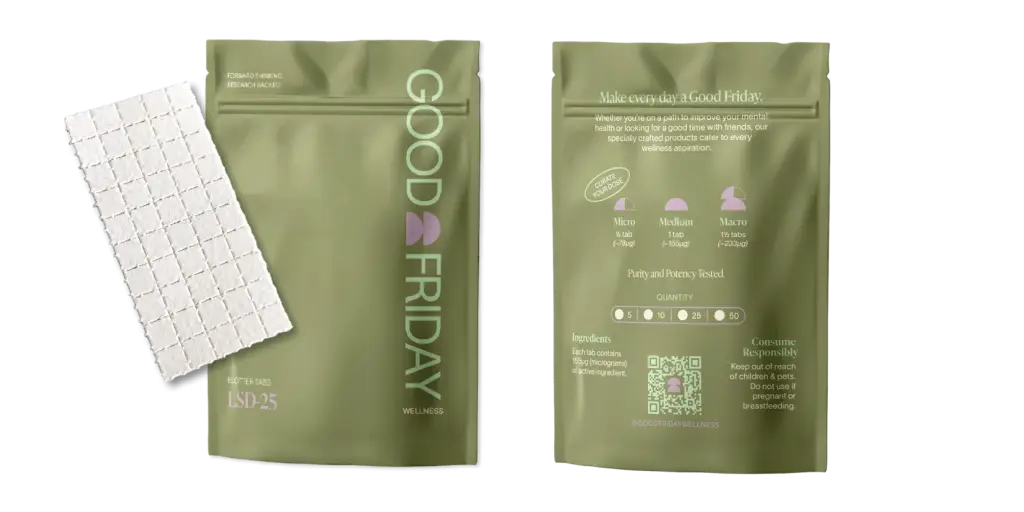Enjoy Secure, Discreet Delivery on All Orders – Plus, Get Free Shipping on Orders Over $150!
As interest in psychedelics continues to grow, so too does our understanding of their potential therapeutic effects. One area that’s captured researchers’ attention is the impact of LSD (lysergic acid diethylamide) on sleep, particularly when administered in small, non-psychedelic doses, known as microdoses. A recent controlled trial out of New Zealand has revealed promising findings about how microdosing LSD could influence sleep patterns, especially in the critical phase known as REM (Rapid Eye Movement) sleep. Let’s dive into the study and explore what it might mean for the future of sleep health and mental well-being.
The New Zealand study focused on 80 male participants who received either a placebo or a 10-microgram microdose of LSD every third day. Using wearable devices to track sleep data, researchers discovered two notable effects among those who took LSD: they fell asleep earlier and experienced an increase in overall sleep duration the night after a microdosing day. On average, these participants slept 24 minutes longer than the placebo group.
More intriguing still, the study highlighted an increase in REM sleep, specifically around 8 minutes more than those who took a placebo. REM sleep, the phase associated with vivid dreams, is crucial for emotional regulation, memory consolidation, and cognitive processing. Improvements in REM could potentially enhance overall mental and emotional well-being, adding to the appeal of microdosing for those seeking mental health support.
One of the most curious aspects of the study is that the sleep improvements only appeared the night following a microdosing day. This delayed effect suggests several potential explanations.
First, LSD has a relatively long half-life, meaning it stays in the body and brain longer than many other substances, even in small doses. This prolonged presence might contribute to a slow, cumulative effect on brain chemistry that manifests later.
Another hypothesis is that microdosing induces subtle shifts in brain activity, gradually recalibrating neural pathways associated with sleep. These shifts might affect how the brain manages its sleep-wake cycles over time, especially in a way that benefits REM sleep. While these explanations are still speculative, they open intriguing avenues for future research to decode how LSD microdosing interacts with our neurobiology.
The implications of these findings could extend beyond sleep alone, especially in the realm of mental health. Conditions like depression and PTSD (Post-Traumatic Stress Disorder) are often closely linked to sleep disturbances, and improvements in sleep—particularly REM sleep—are known to benefit emotional stability, stress resilience, and mood regulation.
Increased REM could support healthier emotional processing, helping individuals manage daily stress and build a stronger emotional foundation. This might be especially valuable for individuals with PTSD, as REM plays a role in the brain’s ability to “process” traumatic memories. Likewise, people with depression often experience irregular sleep patterns and reduced REM, so boosting REM through microdosing could theoretically offer relief, especially when combined with other forms of therapy.
While the findings are exciting, it’s crucial to approach them with caution. The New Zealand study, though groundbreaking, is a preliminary exploration into a complex area. The researchers emphasized that these effects may not apply to everyone and that further studies are needed to understand LSD’s sleep-enhancing potential fully.
Additionally, microdosing remains in a legal and scientific gray area. In many places, including Canada, where interest in microdosing is high, LSD is still classified as an illegal substance. Though law enforcement often deprioritizes cases involving small, personal-use amounts, the risks of legal consequences still exist, and people should be well-informed before exploring any form of psychedelic use.
The growing interest in microdosing LSD and other psychedelics points to a broader movement towards alternative therapies for mental health. As research expands, we may see a shift in how psychedelics are perceived—not just as recreational substances but as tools for wellness, perhaps even for sleep enhancement.
To harness these potential benefits safely, more rigorous studies are needed. Future research might focus on how different dosages, frequencies, and even combinations with other substances could optimize LSD’s effects on sleep. Further understanding the neurochemical mechanisms involved would also help clarify how microdosing impacts the sleep cycle.
As the conversation around psychedelics becomes more mainstream, we can hope that a clearer understanding will emerge, potentially leading to regulated, safe use in the context of mental health and well-being. For now, studies like this serve as valuable stepping stones, showing us glimpses of how a microdose can ripple through various aspects of human health.
While we’re still in the early stages of understanding the link between LSD microdosing and sleep, studies like the one in New Zealand show promising potential for psychedelic compounds to influence wellness beyond what was previously thought. From enhancing REM to possibly aiding in emotional and memory processing, microdosing could open new doors in both sleep science and mental health.
As with all emerging treatments, it’s essential to tread carefully. Those interested in exploring the potential benefits of microdosing should consult medical professionals and stay updated on the legal status and research developments surrounding psychedelics. Until then, the link between LSD and sleep remains an exciting area of research, one that may ultimately reshape our approach to sleep health and therapeutic interventions.
If you’re curious to explore how microdosing LSD could enhance your well-being, our high-quality LSD 25 tabs offer a convenient starting point. With precise dosages and trusted sourcing, you can experience the potential benefits of microdosing with confidence. Explore our LSD 25 tabs here and begin your journey toward improved sleep, mood, and mental clarity.
